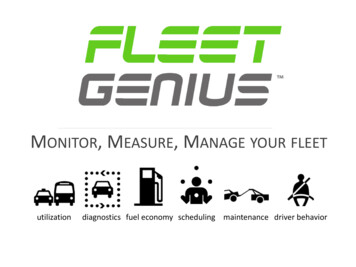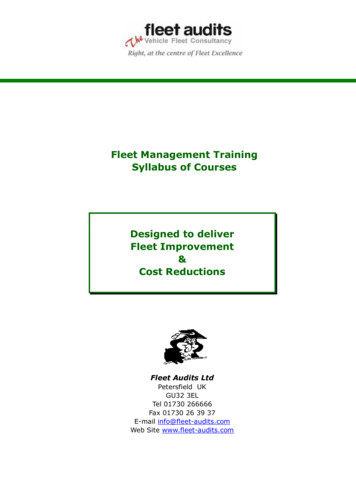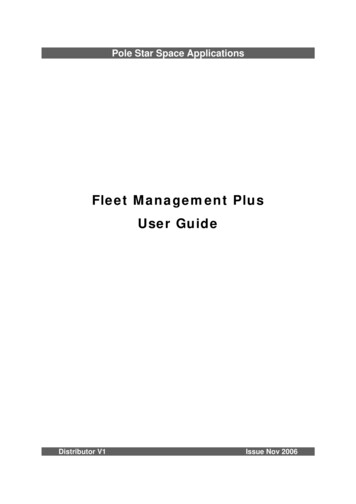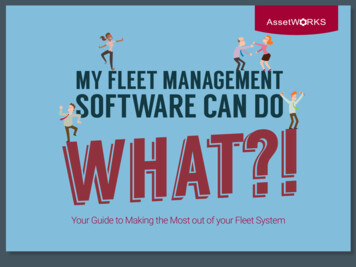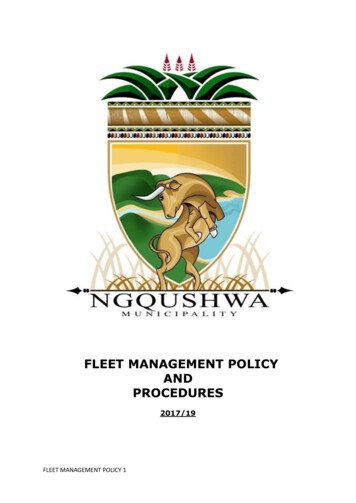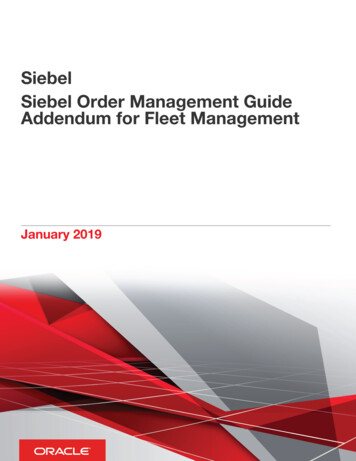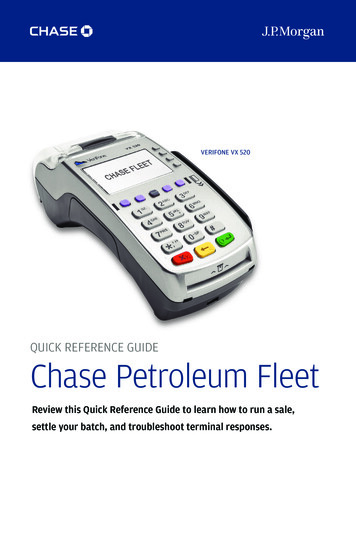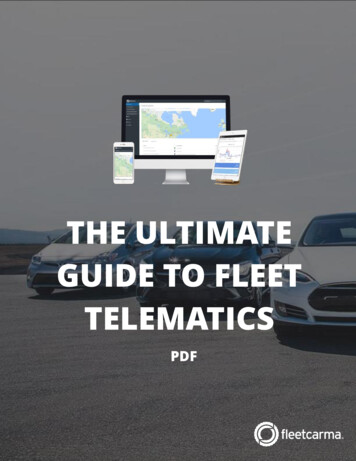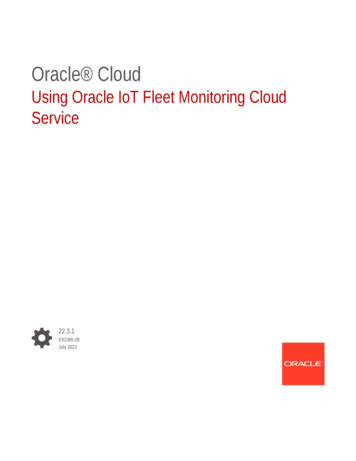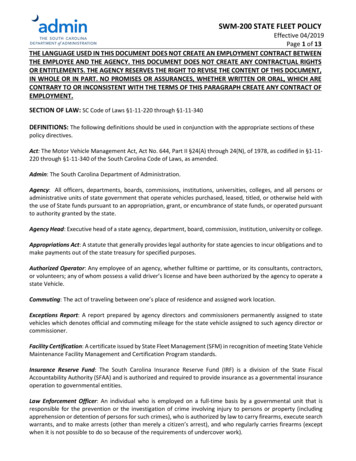
Transcription
SWM-200 STATE FLEET POLICYEffective 04/2019Page 1 of 13THE LANGUAGE USED IN THIS DOCUMENT DOES NOT CREATE AN EMPLOYMENT CONTRACT BETWEENTHE EMPLOYEE AND THE AGENCY. THIS DOCUMENT DOES NOT CREATE ANY CONTRACTUAL RIGHTSOR ENTITLEMENTS. THE AGENCY RESERVES THE RIGHT TO REVISE THE CONTENT OF THIS DOCUMENT,IN WHOLE OR IN PART. NO PROMISES OR ASSURANCES, WHETHER WRITTEN OR ORAL, WHICH ARECONTRARY TO OR INCONSISTENT WITH THE TERMS OF THIS PARAGRAPH CREATE ANY CONTRACT OFEMPLOYMENT.SECTION OF LAW: SC Code of Laws §1-11-220 through §1-11-340DEFINITIONS: The following definitions should be used in conjunction with the appropriate sections of thesepolicy directives.Act: The Motor Vehicle Management Act, Act No. 644, Part II §24(A) through 24(N), of 1978, as codified in §1-11220 through §1-11-340 of the South Carolina Code of Laws, as amended.Admin: The South Carolina Department of Administration.Agency: All officers, departments, boards, commissions, institutions, universities, colleges, and all persons oradministrative units of state government that operate vehicles purchased, leased, titled, or otherwise held withthe use of State funds pursuant to an appropriation, grant, or encumbrance of state funds, or operated pursuantto authority granted by the state.Agency Head: Executive head of a state agency, department, board, commission, institution, university or college.Appropriations Act: A statute that generally provides legal authority for state agencies to incur obligations and tomake payments out of the state treasury for specified purposes.Authorized Operator: Any employee of an agency, whether fulltime or parttime, or its consultants, contractors,or volunteers; any of whom possess a valid driver’s license and have been authorized by the agency to operate astate Vehicle.Commuting: The act of traveling between one’s place of residence and assigned work location.Exceptions Report: A report prepared by agency directors and commissioners permanently assigned to statevehicles which denotes official and commuting mileage for the state vehicle assigned to such agency director orcommissioner.Facility Certification: A certificate issued by State Fleet Management (SFM) in recognition of meeting State VehicleMaintenance Facility Management and Certification Program standards.Insurance Reserve Fund: The South Carolina Insurance Reserve Fund (IRF) is a division of the State FiscalAccountability Authority (SFAA) and is authorized and required to provide insurance as a governmental insuranceoperation to governmental entities.Law Enforcement Officer: An individual who is employed on a full-time basis by a governmental unit that isresponsible for the prevention or the investigation of crime involving injury to persons or property (includingapprehension or detention of persons for such crimes), who is authorized by law to carry firearms, execute searchwarrants, and to make arrests (other than merely a citizen’s arrest), and who regularly carries firearms (exceptwhen it is not possible to do so because of the requirements of undercover work).
SWM-200 STATE FLEET POLICYEffective 05/2019Page 2 of 13Management Review Report: An annual accountability report that highlights the accomplishments of SFM,provides information on state vehicles, and the compliance of each agency with the objectives of the act, andoffers recommendations for further improvements across the state.Materials Management Office: The section of SFAA procurement services that manages the annual vehiclecontract(s) solicitation and awards process.Motor Pool: Any vehicle or group of vehicles not permanently assigned to a single individual and available forofficial use by several authorized operators within an agency.Motor Vehicle Record: A report of a licensed driver’s driving history, as reported from the South CarolinaDepartment of Motor Vehicles. Information on this report may include driver’s license information, point history,violations, convictions and license status on the driving record.Permanent Assignment: Assignment of a state vehicle for the individual use of an authorized operator.Procurement Code: The South Carolina Consolidated Procurement Code is codified in §11-35-10 et seq. of theSouth Carolina Code of Laws, as amended.SFM: The state fleet management section of the division of state agencies support services.SFM Maintenance Facilities Certification Program: An annual review of state vehicle maintenance facilities. Thisreview certifies that shop operations are cost-effective, comply with the act, and maintain state vehicles in a safeoperating condition.State: The state of South Carolina.State Driver: An individual who operates a vehicle to conduct state business, or where there is an expectationthat the individual will operate a vehicle in the performance of their job duties.State Fiscal Accountability Authority (SFAA): The five-member panel as set forth in §11-55-10 et seq. of the SCCode of Laws, as amended.State Fleet Manager: The director of state fleet management.State Fuel Card: A State issued charge card assigned to each state vehicle to be utilized with a personalidentification number (PIN) in accordance with the fuel card instructions provided by SFM.State Government License Plates: Permanent state governmental license plates assigned to state vehicles.State Vehicle: Any vehicle operated to conduct state business, whether owned, leased or rented by the state.State Vehicle Maintenance Facility: A facility that provides maintenance and repairs to state vehicles and operateswith state funds, according to authority granted by the State to all state agencies.Statewide Elected Official: Also known as state constitutional officers. The executive department of the stateconsists of the following officers: Governor, Lieutenant Governor, Secretary of State, Treasurer, Attorney General,Comptroller General, Superintendent of Education and Commissioner of Agriculture.
SWM-200 STATE FLEET POLICYEffective 05/2019Page 3 of 13Surplus Property Officer: A representative at the South Carolina Surplus Property Office that manages, amongother things, the process for disposing of state vehicles that are determined to be surplus to the needs of the stateand prepares surplus state vehicles for sale.Trip Log: A form utilized by authorized operators of state vehicles to record beginning and ending mileage and jobfunction performed for each vehicle trip, unless exempted by law.Vehicle: Any vehicle, self-propelled or drawn by mechanical power, designed to be principally operated on publiclymaintained roadways in the transportation of property or passengers, and which requires registration andlicensing in accordance with the laws of the State.PURPOSE/BACKGROUND: These policy directives are issued by the South Carolina Department ofAdministration (Admin) in accordance with §1-11-260 of the S.C. Code of Laws, and establish the requirementsfor the acquisition, assignment, identification, replacement, disposal, maintenance, and operation of statevehicles operated, maintained, purchased, or otherwise acquired by agencies.State Fleet Management — These policy directives, issued by Admin in accordance with §1-11-260 of the S.C. Code of Laws establish therequirements for the acquisition, assignment, identification, replacement, disposal, maintenance andoperation of state vehicles. State vehicles, as defined below, are those vehicles operated, maintained,purchased, or otherwise acquired by agencies, in whole or in part, with funds issued pursuant to anappropriation or grant from the state. State vehicles also include those vehicles purchased with other fundsand titled to the state and those donated to or confiscated by the state. Nothing contained in these policy directives shall be construed to waive any rights, remedies, or defensesthe state might have under the laws of the state.Fleet Maintenance Program — These policy directives set forth the requirements for the establishment of a cost-effective state vehiclemaintenance program which shall apply to all state vehicles and state vehicle maintenance facilities. Themaintenance of state vehicles is the responsibility of the individual and agency to which the vehicle isassigned.Fleet Safety Program — These policy directives issued by SFM set forth the policies and requirements for the establishment of a fleetsafety program. The SFM fleet safety program shall apply to all operators of state vehicles.GUIDELINES:I. State Fleet ManagementA. Exemptions1. The South Carolina Department of Education’s school buses and service vehicles are exempt fromcertain provisions of these policy directives per §1-11-330 of the S.C. Code of Laws. Notwithstandingthe foregoing, this exemption does not extend to the provisions of these policy directives thatpertain to §1-11-340 of the S.C. Code of Laws (Fleet Safety).2. As set forth in Section II-IV of these policy directives, the titles to vehicles operated by the SouthCarolina Department of Transportation are to be retained by the agency per §1-11-310(E) of the SCCode of Laws.3. Vehicles operated by the Department of Commerce are exempt from the vehicle acquisitionprovisions of §1-11-310(B) of the S.C. Code of Laws.
SWM-200 STATE FLEET POLICYEffective 05/2019Page 4 of 134. As the State Ports Authority and the South Carolina Public Service Authority are not deemedagencies, as defined herein, the provisions of the act and these policy directives are not applicableto the State Ports Authority and/or the South Carolina Public Service Authority.B. Organizational Authority1. Admin is authorized and directed to develop and administer a comprehensive fleet managementprogram for the state’s vehicle fleet. Admin has delegated this administrative authority to the StateFleet Manager to act on its behalf, pursuant to these policy directives.2. SFM, headed by the State Fleet Manager, shall manage the state’s vehicle fleet, pursuant to thesepolicy directives, as directed by Admin.3. SFM shall monitor compliance by agencies with the act and these policy directives. SFM shallperiodically, as specified by law, prepare and submit a Management Review Report to Admin andthe General Assembly concerning the performance of each agency in complying with the act andthese policy directives. Agencies shall supply sufficient and accurate information as requested bySFM to evaluate compliance and prepare the Management Review Report. SFM may denypurchasing of new vehicles to any agency failing to comply with these policy directives or any otherfleet management directive issued by the State Fleet Manager until the agency complies with saiddirective(s).II.Fleet Operations ProgramA. Assignment and UseAssignment of a state vehicle for individual use shall not be made as a perquisite of office, except forthe Governor, statewide elected officials, and agency heads, or for the personal convenience of anindividual, official, or employee, nor shall personal assignment of a state vehicle continue if there is noofficial need.1. Assignment Criteria — The assignment of a state vehicle to an individual for exclusive use shall bebased on the following criteria:a. Travel requirements of an appropriate number of annual official miles as determined by SFM.Travel between home and a place of employment is not considered official travel unlessauthorized by regulation;b. State vehicles required for the individual use of the Governor, statewide elected officials, andagency heads shall be provided based solely on their office;c. State vehicles may be assigned individually to full-time, line law enforcement officers, asdetermined by agency heads and confirmed annually;d. State vehicles essential to the performance of official duties by individuals whose remotelocation or total official business use requirements are such that they preclude pooled use bymembers of the same or other work units;e. Highly specialized vehicles and heavy equipment where operator training, or technical skillrequirements preclude use of the vehicle by individuals not possessing such training or skills;f. Circumstances, as determined by the agency head, which warrant individual assignment in thebest interests of the state;2. When state vehicles are requested to be permanently assigned to individuals, the agency shallcomplete and submit the required form to SFM. This form shall be updated by the agency uponchanges to the assignment of either the state vehicle or the employee.3. Agencies operating motor pools shall manage such motor pools in accordance with proceduresapproved by SFM.4. State vehicles are authorized for use in the performance of all travel or tasks necessary toaccomplish official state business that is within the rated design capacity of the vehicle. Use is notauthorized for unofficial travel, the transport of unauthorized persons or items, or the performanceof tasks outside the rated capacity of the vehicle.
SWM-200 STATE FLEET POLICYEffective 05/2019Page 5 of 135. Authorized Usea. Non-State employees such as students, volunteers, contractual services personnel, inmates,vendors, or industry representatives who possess a valid driver’s license may be permitted tooperate a state vehicle only if such use is official business of the state, within the insurancecoverage provided on the vehicle, and is authorized by the agency head or their designee.b. Authorized uses of state vehicles include, but are not limited to:i.Travel between place of vehicle dispatch and location of performance of officialbusiness;ii.When on official out-of-town travel status, travel between place of temporary lodgingand place of official business;iii.When on official out-of-town travel status between either of the above places and:(a) Places to obtain suitable meals;(b) Places to obtain medical assistance, including pharmacies;(c) Places of worship;(d) Barber shops or hairdresser;(e) Garment or vehicle cleaning establishments; or(f) Similar places required to sustain health and welfare or continued efficientperformance of the authorized operator, exclusive of places of entertainment;iv.Transport of state elected officials, state employees, or official state guests, all of whommust be on official business of the state;v.Transport of professional or commercial representatives when in the direct interest ofthe state;vi.Transport of materials, supplies, parcels, luggage, kits, or other items belonging to orserving the interests of the state;vii.Transport of any person or item in any emergency, provided such movement does notendanger life or property;viii.Children transported in a state vehicle shall be properly secured in a child restraintsystem that meets federal motor vehicle safety standards and as prescribed by the lawsof the state.ix.Other persons may accompany an authorized operator in a state vehicle on authorizeduse provided:(a) No additional cost or expense is incurred by the state for such travel; and(b) Prior approval is obtained from the applicable agency head or their designee forsuch travel;x.Domicile to duty transportation when authorized by the agency head.6. Unauthorized Use — unauthorized uses of state vehicles include, but are not limited to:a. Travel or task of a personal nature having no connection with the accomplishment of officialstate business or beyond the rated capacity of the vehicle;b. Transport of other persons not serving the interests of the state;c. Transport of hitchhikers;d. Transport of pets that are not service animals;e. Tobacco use, smoking, and vaping are prohibited in all state vehicles;f. Transport of items or cargo having no relation to the conduct of official state business;g. Transport of acids, explosives, weapons, ammunition, non-prescribed medicines, alcoholicbeverages, highly flammable materials except by specific agency authorization or by a dulycommissioned law enforcement officer acting within his or her assigned duty;h. Transport of any kind of equipment or cargo projecting from the side, front, or rear of the statevehicle in such a manner as to constitute a hazard to safe driving, to pedestrians, or to othervehicles;
SWM-200 STATE FLEET POLICYEffective 05/2019Page 6 of 13i.Extending the length of time of travel beyond that required to complete the official statepurposes of the trip;j. Use of the state vehicle to provide transportation between home and place of official statebusiness unless authorized by the agency head. The fact that an employee is “on-call” does notin itself justify this authorization. The urgency of employee availability and frequency of actualrecall must be factually justified to SFM to qualify as authorized use;k. Travel to or from social events unless acting as an official representative of the state;l. Use of a state vehicle while on annual leave.7. Use of Trip Logs and Exceptions Reportsa. Trip Logs: Trip logs, in the form as approved by SFM, shall be completed by all individualsoperating state vehicles, whether they are or are not permanently assigned. The log shallspecify beginning and ending mileage and the job function performed. This requirement doesnot pertain to the Governor, statewide elected officials, full-time line law enforcement officers,vehicles with a gross vehicle weight exceeding 10,000 pounds, and school buses and servicevehicles assigned to the South Carolina Department of Education.b. Exceptions Reports: Agency directors and commissioners to whom state vehicles arepermanently assigned may maintain an Exceptions Report in lieu of Trip Logs. TheseExceptions Reports may be maintained on either a monthly or quarterly basis and will denoteonly total official and commuting mileage.c. Retention Period: Copies of Trip Logs and Exceptions Reports shall be maintained by the agencyoperating the vehicle for a minimum three-year period and shall be made available for periodicreview by auditors or SFM.B. Acquisition of State Vehicles1. In accordance with the procurement code, a vehicle specifications committee may be appointed bythe chief procurement officer to assist with respect to vehicle specifications and procurement. Thecommittee shall provide technical advice and expertise to ensure that proper vehicles andequipment are available for official state use. The number and qualification of members of thecommittee shall be determined by the chief procurement officer.2. All agencies seeking to purchase, lease, or otherwise acquire vehicles, regardless of the source offunding, shall do so in accordance with the procurement code. SFM shall annually establish classesof vehicles, with appropriate equipment, to be placed on contract by the Materials ManagementOffice for use in conducting official state business. SFM shall develop vehicle type and sizeprocurement criteria which shall be based solely on the functional task(s) to be performed by thevehicle. No deviations from the approved annual listing shall be permitted without prior writtenapproval of the State Fleet Manager. In the event a special purpose vehicle is required and notshown on the approved listing, the requesting agency shall inform the State Fleet Manager whoshall, in conjunction with that agency, determine the proper vehicle and equipment to bepurchased. The approved annual listing shall be provided to each agency.3. Purchase orders must be submitted to SFM prior to the expiration of the annual state contract forthe class of vehicle requested. If purchase orders are submitted during the period when no generalvehicle purchase contracts are in effect, complete justification for off-cycle purchasing must beforwarded with a purchase requisition containing the desired specifications. Purchase of a vehicleto prevent loss of funds will not be considered a valid justification.4. The following requirements shall apply when purchasing new vehicles.a. Purchase orders for vehicles shall be forwarded to SFM. Agencies shall supply any additionalinformation necessary for SFM to order vehicles on the agencies’ behalf. Agencies shallindicate if the requested vehicle is a replacement for an existing vehicle or an additionalvehicle. Justification must be provided for any “increase in class” change for existing vehicles,or for any additional vehicles above current allowance. Existing vehicles to be replaced with a
SWM-200 STATE FLEET POLICYEffective 05/2019Page 7 of 13newly purchased vehicle shall be sent for disposal in accordance with the applicable laws andregulations relating to disposal of surplus state property within 90 days of delivery orplacement in service of the existing vehicle’s replacement, unless written permission to retainthe existing vehicle is obtained from SFM.b. SFM shall notify the requesting agency of the status of each request and forward approvedpurchase orders to the appropriate vehicle vendor. Only SFM shall submit purchase ordersdirectly to vehicle vendors.c. All new vehicles delivered to the state shall be inspected by SFM to ensure purchase ordershave been properly filled. Vehicles purchased by the South Carolina Department ofTransportation and school buses and service vehicles purchased by the South CarolinaDepartment of Education shall be delivered to these agencies’ designated facilities forinspection. Other vehicles delivered directly to agencies may be inspected locally, upon priorapproval by SFM.d. When a vehicle is delivered to the receiving agency, modifications shall not be made to thevehicle or optional equipment added that will alter the vehicle without prior written approvalof SFM. The addition of lights, sirens, radios, and similar equipment used on law enforcementor emergency response vehicles shall not require prior approval, nor shall installation of utilitybodies and features on cab and chassis type vehicles.e. Agencies leasing vehicles for periods more than 30 days shall also comply with therequirements of these directives and the procurement code.5. The following requirements shall apply when purchasing used or surplus vehicles.a. Requests to purchase used or surplus vehicles shall be forwarded to SFM. Agencies shall supplyinformation concerning the make, model, body style and mileage of the vehicle. SFM shallconsider each request and notify the requesting agency and the agency from which the vehiclewill be purchased, if applicable, if the request is approved. The transfer of funds shall beconducted by the state’s Surplus Property Officer.b. As with the purchase of new vehicles, the following requirements shall apply:i. Agencies shall indicate if the requested vehicle is a replacement for an existing vehicle.ii. Justification must be provided for additional vehicles above current allowance.iii. Existing vehicles to be replaced with a purchased used or surplus vehicle shall be sentfor disposal in accordance with the applicable laws and regulations relating to thedisposal of surplus state property within ninety days of delivery or placement in serviceof the existing vehicle’s replacement, unless written permission to retain the existingvehicle is obtained from SFM.c. SFM shall request, and agencies shall supply, information necessary for SFM to: Transfer or obtain license plate and title. Adjust the state’s vehicle inventory.C. Vehicle Inventory System1. SFM shall maintain a current inventory of the state’s vehicle fleet. Agencies shall assist SFM withkeeping the inventory current. The inventory shall indicate make and model, original acquisitioncost and the manufacturer’s identifying serial number (VIN) for each vehicle.2. Vehicles shall be added to the inventory upon receipt of title and documentation as specified bySFM. Vehicles shall be deleted from the inventory upon receipt of a bill of sale for each vehicle.3. The school buses and service vehicles operated by the South Carolina Department of Education arenot included in the SFM State fleet inventory system. Vehicles operated by the South CarolinaDepartment of Transportation are included in the system.D. Registration and Licensing1. Every state vehicle shall be registered and licensed in accordance with state law regardless of howthe vehicle is acquired. All state vehicles shall be titled to the state. All such titles shall be received
SWM-200 STATE FLEET POLICYEffective 05/2019Page 8 of 13by and remain in the possession of SFM, except titles to vehicles specifically exempt from thisrequirement as specified by law (see Section 1-11-310(E) of the SC Code of Laws providing thattitles to school buses and services vehicles operated by the South Carolina Department ofEducation and vehicles operated by the South Carolina Department of Transportation are to beretained by those agencies). Vehicles used by state agencies or employees that are leased fromcommercial sources and federally-owned or registered vehicles are not considered state vehicles;however, all rules and policy directives relative to official use, except identification, registration,and licensing, apply while such vehicles are under the control of the state.2. The following requirements shall apply to registration and licensing of state vehicles.a. Requests for license plates, titles and license plate renewals shall be submitted to SFM. SFMwill obtain and forward license plates to the requesting agency. Vehicles received throughSFM’s central receiving station for an agency will be registered and licensed without priorrequest from the agency.b. At the time of purchase or acquisition, all state vehicles, except for, South CarolinaDepartment of Transportation Vehicles and Department of Education buses and servicevehicles, shall be registered with the South Carolina Department of Motor Vehicles showingthe state as the owner.c. All state vehicles are to be registered through SFM regardless of how vehicles are acquired.Agencies purchasing used or surplus vehicles shall supply documentation and informationnecessary for SFM to register, license and inventory such vehicles.3. Decals, signs and stickers other than state government license plates and state or agencyidentifying decals may be displayed on state vehicles only under the following conditions:a. Decals, signs and stickers required by law or permitted by this policy directive;b. Parking lot decals;c. Agency administrative or control decals;E. And other identifiers as may be approved by SFM.Disposal of State Vehicles1. SFM shall develop disposal criteria for all state vehicles subject to these policy directives. The saleof all state vehicles that qualify for disposal, or units declared to be excess to the needs of thestate, shall be conducted in accordance with applicable laws and regulations relating to disposal ofsurplus state property. SFM shall determine whether a vehicle is past its cost-effective useful lifeor excess to the needs of the state before allowing its sale or disposal.2. The following requirements shall apply to the disposal of state vehicles:a. Agencies may request to dispose of a state vehicle once the state vehicle has reached orexceeded the recommended minimum disposal criteria or is excess to the needs of theowning agency.b. The State Fleet Manager shall determine whether the vehicle meets the minimum disposalcriteria or is in excess to the needs of the state. SFM shall notify the owning agency and theSurplus Property Officer if the state vehicle has been approved for disposal. State vehicles notexcess to the needs of the state may be transferred between agencies.c. The Surplus Property Officer shall sell or transfer the state vehicle for the agency unless statelaw or regulation requires otherwise.d. Seals, decals and other identification strips as determined by the Surplus Property Officer shallbe removed from vehicles before delivery for disposal.F. Reimbursement for Use of Privately-Owned Vehicles1. State vehicles are intended for use by authorized operators who are required to travel in theperformance of official state business.2. Personal vehicles shall not be used to accomplish official state travel on a reimbursable basis whena state vehicle is reasonably available and adequate to meet necessary travel requirements.
SWM-200 STATE FLEET POLICYEffective 05/2019Page 9 of 13Exceptions to this policy may be approved by the agency director authorizing the travel to meetagency requirements. When such an exception is granted, agencies shall reimburse employees atthe lower privately-owned reimbursement rate as specified in the current appropriations act.3. This reimbursement policy does not preclude the use of aircraft, trains or car rental services.G. ComplaintsSFM is responsible for receiving complaints concerning the possible misuse of state Vehicles. SFM shallobtain information concerning the circumstances of each incident and forward complaints to thecontrolling agency for investigation. Agencies receiving complaints not referred from SFM shallinvestigate each incident and forward a copy of the complaint summary and correspondence to SFM.H. State Fuel Cards1. SFM administers the State Fuel System Program. Vendors are contracted in accordance with theprocurement code with established pricing structures and supply requirements for state owned fuelsites.2. State Fuel Card purchases shall be made under the following restrictions:a. Official state fuel cards issued by SFM are valid for the purchase of fuel, oil, lubricants, andother related petroleum products in an amount not to exceed the rated capacity of the vehicleequipment. Restricted emergency repairs, not to exceed a limit set by the agency responsiblefor purchases made with the state fuel card, may also permitted.b. State fuel card purchases shall be made by state employees and other authorized operators,and limited to use in or by equipment owned, rented or leased by the state as identified onthe fuel card. Use of the state fuel card to procure goods or services by unauthorized persons,to procure unauthorized goods or services by any person, or for the purchase goods orservices for privately owned vehicles is prohibited.c. State fuel cards can be used at commercial
Fleet Safety Program — These policy directives issued by SFM set forth the policies and requirements for the establishment of a fleet safety program. The SFM fleet safety program shall apply to all operators of state vehicles. GUIDELINES: I. State Fleet Management . A. Exemptions . 1.

